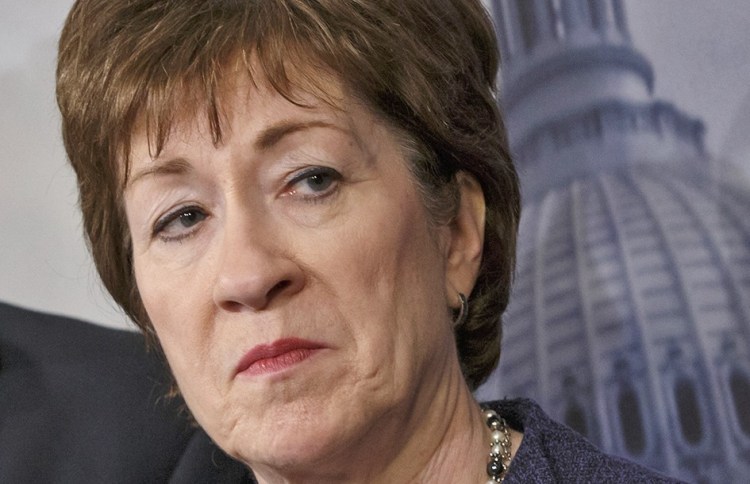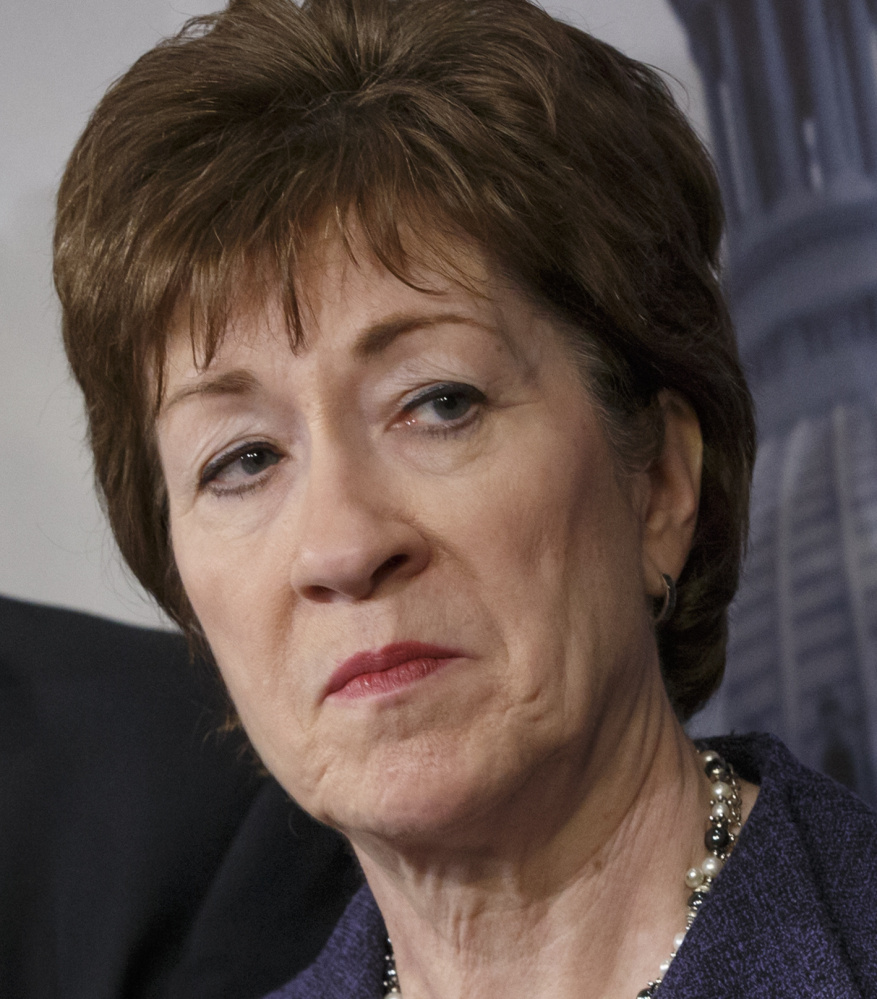U.S. Sen. Susan Collins criticized Donald Trump on Monday, saying his comments questioning the objectivity of judges based on their ethnicity or religion were “absolutely unacceptable.”
Collins was among a chorus of Republicans denouncing Trump over the presidential nominee’s comments that an American-born judge should recuse himself from a lawsuit involving Trump University because of his “Mexican heritage,” and subsequent Trump questioning of whether he could receive a fair hearing from Muslim judges.
“Donald Trump’s comments on the ethnic heritage and religion of judges are absolutely unacceptable,” Collins said in a written statement Monday. “His statement that Judge (Gonzalo) Curiel could not rule fairly because of his Mexican heritage does not represent our American values. Mr. Trump’s comments demonstrate both a lack of respect for the judicial system and the principle of separation of powers.”
Collins has not endorsed Trump, but has always supported previous Republican presidential nominees.
Trump made the initial comment late last week regarding Curiel, a federal judge for the Southern District of California who is presiding over civil lawsuits against Trump University. The candidate suggested that Curiel’s “Mexican heritage” created a conflict of interest, given Trump’s pledge to “build a wall” along the Mexico-U.S. border to deter illegal immigration.
Hand-wringing increased within Republican ranks Sunday when the host of CBS-TV’s “Face the Nation” program, John Dickerson, asked Trump whether he believes a Muslim judge would treat him unfairly given his repeated statements that the U.S. should temporarily ban Muslims from entering the country.
“It’s possible, yes,” Trump replied. “Yeah. That would be possible, absolutely.”
The two highest-ranking Republicans in Congress, House Speaker Paul Ryan of Wisconsin and Senate Majority Leader Mitch McConnell of Kentucky, both sought to distance themselves from Trump’s comments Sunday. Many more Republicans publicly criticized Trump on Monday, with Florida senator and former presidential candidate Marco Rubio calling on Trump to stop making such comments.
“I don’t think it reflects well on the Republican Party. I don’t think it reflects well on us as a nation,” Rubio, the son of Cuban immigrants, told Orlando television station WFTV, according to The Associated Press.
Unlike many of her Republican leaders in Washington, including Ryan and McConnell, Collins has yet to endorse Trump. The moderate Republican had supported former Florida Gov. Jeb Bush’s presidential bid, but told reporters at the Maine Republican Party’s state convention in April – months after Bush dropped out – that she did not anticipate making any more endorsements before the Republican National Convention in July.
In early May, immediately after Sen. Ted Cruz’s withdrawal from the race cleared the way for Trump, Collins said the New York businessman needed “changes in his approach” and would have to “stop those gratuitous insults.” She also said Trump needed to articulate a more detailed plan for his presidency beyond his “Make America Great Again” campaign slogan.
“I have always supported the Republican nominee for president and I would expect that I would do so this year, but I do want to see what Donald Trump does from here on out,” Collins told WGAN Newsradio. “I hope that he will take the kinds of steps that I said.”
Maine Democratic leaders, meanwhile, seized on the latest controversy to try to put additional pressure on Collins.
“I applaud Sen. Collins for recognizing that the racist remarks made by Donald Trump are ‘absolutely unacceptable,’ but I’m disappointed that her statement failed to denounce Trump’s candidacy entirely,” Phil Bartlett, chairman of the Maine Democratic Party, said in a written statement. “If, as Sen. Collins asserts, such remarks do not ‘reflect our American values,’ then why would she vote for him to serve as America’s president?”
Republican lawmakers across the country continue to struggle with how to deal with Trump.
After months of downplaying and resisting his candidacy, many Republican congressional leaders have reluctantly endorsed him on grounds that a Trump presidency would be far better for their own policy objectives than Hillary Clinton in the White House. But Trump’s penchant for making controversial statements – and then doubling down on them amid the resulting uproar – has forced them to distance themselves from a candidate who has won millions of votes nationwide from a fired-up contingent of the party’s base.
A case in point is Collins’ New England neighbor, Sen. Kelly Ayotte of New Hampshire, who is facing a credible challenge from Democratic Gov. Maggie Hassan this fall.
Ayotte’s office recently told New Hampshire news outlets that the Republican senator “plans to support the nominee,” but that she would not publicly endorse any candidate. Responding to Trump’s most recent controversial statements, Ayotte told WMUR and other news outlets that they were “offensive and wrong, and he should retract them.”
Similarly, House Speaker Ryan endorsed Trump last Thursday after months of hedging on the candidate. One day later, Ryan was disavowing Trump’s statements about the judge.
Kevin Miller can be contacted at 791-6312 or at:
Twitter: KevinMillerPPH
Copy the Story LinkSend questions/comments to the editors.





Success. Please wait for the page to reload. If the page does not reload within 5 seconds, please refresh the page.
Enter your email and password to access comments.
Hi, to comment on stories you must . This profile is in addition to your subscription and website login.
Already have a commenting profile? .
Invalid username/password.
Please check your email to confirm and complete your registration.
Only subscribers are eligible to post comments. Please subscribe or login first for digital access. Here’s why.
Use the form below to reset your password. When you've submitted your account email, we will send an email with a reset code.